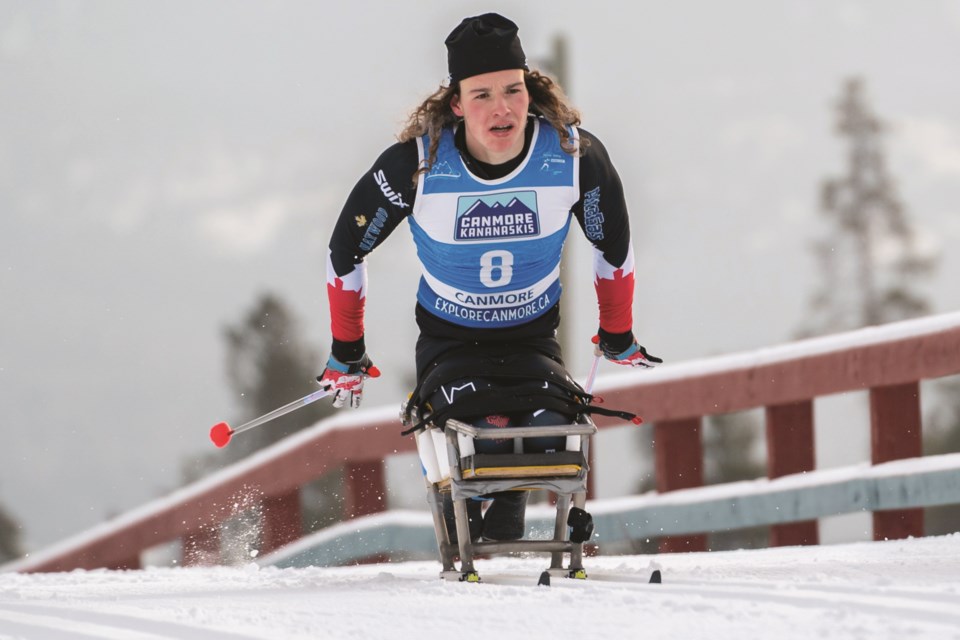For Pemberton Paralympian and Nordic sit-skier Ethan Hess, competing at the 2018 Paralympic Winter Games was the realization of a dream four years in the making.
Now, with the 2022 Games fast approaching, the 22-year-old is looking to build on past successes.
For his entire life, Hess has always been drawn to a life in sport. Growing up, like most in the Sea to Sky, much of his time was spent on the slopes with friends. But living with spina bifida, as Hess grew, his condition made it harder and more painful to continue skiing standing up, and his friends all started to surpass him athletically.
“It was definitely a mental process of accepting what my body is and what the struggles I’m going to have in my life are, so there was a lot of acceptance I had to go through—especially as you go through puberty and your friends start to develop around you really quickly,” said Hess.
“And in Grade 8 I realized that if I was going to compete in sports at a high level, which I realized pretty early in my teens that was what I wanted to do, I was going to have to go to para-sports.”
Around that time, Hess started to get involved with the Whistler Adaptive Sports Program, where he got his first taste of para-Nordic skiing at a camp held at Whistler Olympic Park. At first, he thought it would be a great way to train for dragon boat racing in the summer. But with success in the sport coming quickly, leading to him joining Team BC and competing at the Canada Games, Nordic skiing became his main athletic focus.
And from that moment, at just 14 years old, the goal of competing in the Paralympic Games became the driving force in Hess’ life.
But despite the “incredible feeling” of achieving the goal he set out for himself, his 24th and 28th place finishes at the 2018 Games, as well as the season as a whole, were a major disappointment for Hess.
“I wasn’t super happy; I was really hoping I could get at least into the top 20,” he said. “When going to the Games, it feels like that year is just going to be a great year for you because you went to the Games, but really I hadn’t made that much development from the year before, so it was actually not a really great season for me,” he said.
“And then the next season I struggled to develop again, [which] led to me having to take some time off after I had a surgery when the antibiotics from the surgery led to some really serious gut issues.”
But with that disappointment, and the time away from the sport due to his surgery and the pandemic that followed shortly after, Hess’ passion was re-ignited, and it became clearer than ever what changes needed to be made in his training to be able to start climbing up the world rankings.
Hess began training like a true professional. Nutrition, meditation, hot and cold therapy and giving his body time to rest all became important aspects of how he approached day-to-day life.
“In the summertime I was waking up at four in the morning and then training until eight in the morning, and then I would sleep from nine a.m. until three in the afternoon, wake up and do another three or four hours of training,” said Hess, adding that the regimen allowed him to get up to 12 hours of sleep and eight hours of training in every day.
“That was a big thing for me, just getting that base of training and also falling in love with the work. Not being so obsessed with results, but being obsessed with loving being out there in nature for hours and hours was a huge mental thing that has boosted my training to a new level.”
With the 2022 Paralympic Winter Games starting March 4, Hess is setting his focus on building off the success he had earlier this year in Canmore, where he was able to break into the top 15 at a World Cup event for the first time in his career.
“I’d like to perform well and be happy in every single race with how I do,” he said. “It would be really nice to make the heats in the sprint race, and if I could break into the top 10 that would make me extremely happy.”
But whether the results are there when all is said and done, the most important thing for Hess at the Paralympics is the opportunity to have a platform where he can show others out there dealing with similar disabilities that anything is possible.
“It’s really important to me to show kids with disabilities, and everyone, that they are capable of more than they may think they are, and also showing people the powers of nature,” he said.
“I love spending time out in nature, that’s why I love to do this sport so much, so I think showing people how important a connection to nature is for your mental and physical wellbeing is really important to me.
“It’s super big that I get to have this platform, and I feel super honoured and privileged for it.”



